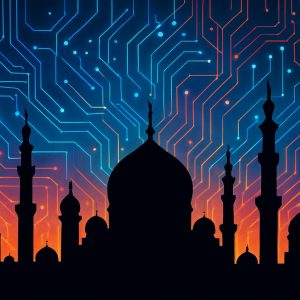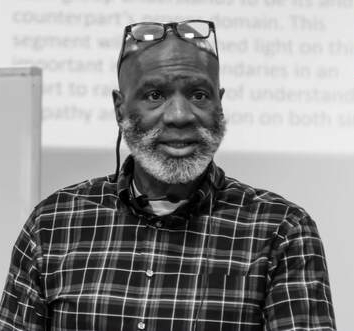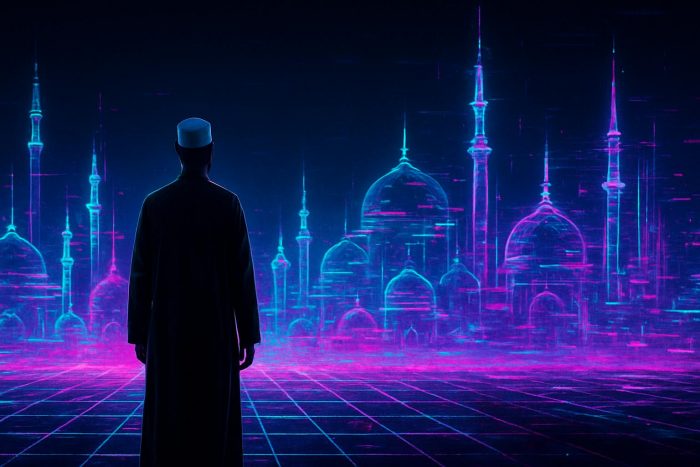#Culture
The Promise of SAIF: Towards a Radical Islamic Futurism
SAIF rejects both the stagnation of the modern Muslim nation‑state and the nostalgic retreat into medieval forms, brazenly dreaming of a future built not through reform, but rupture.
Published
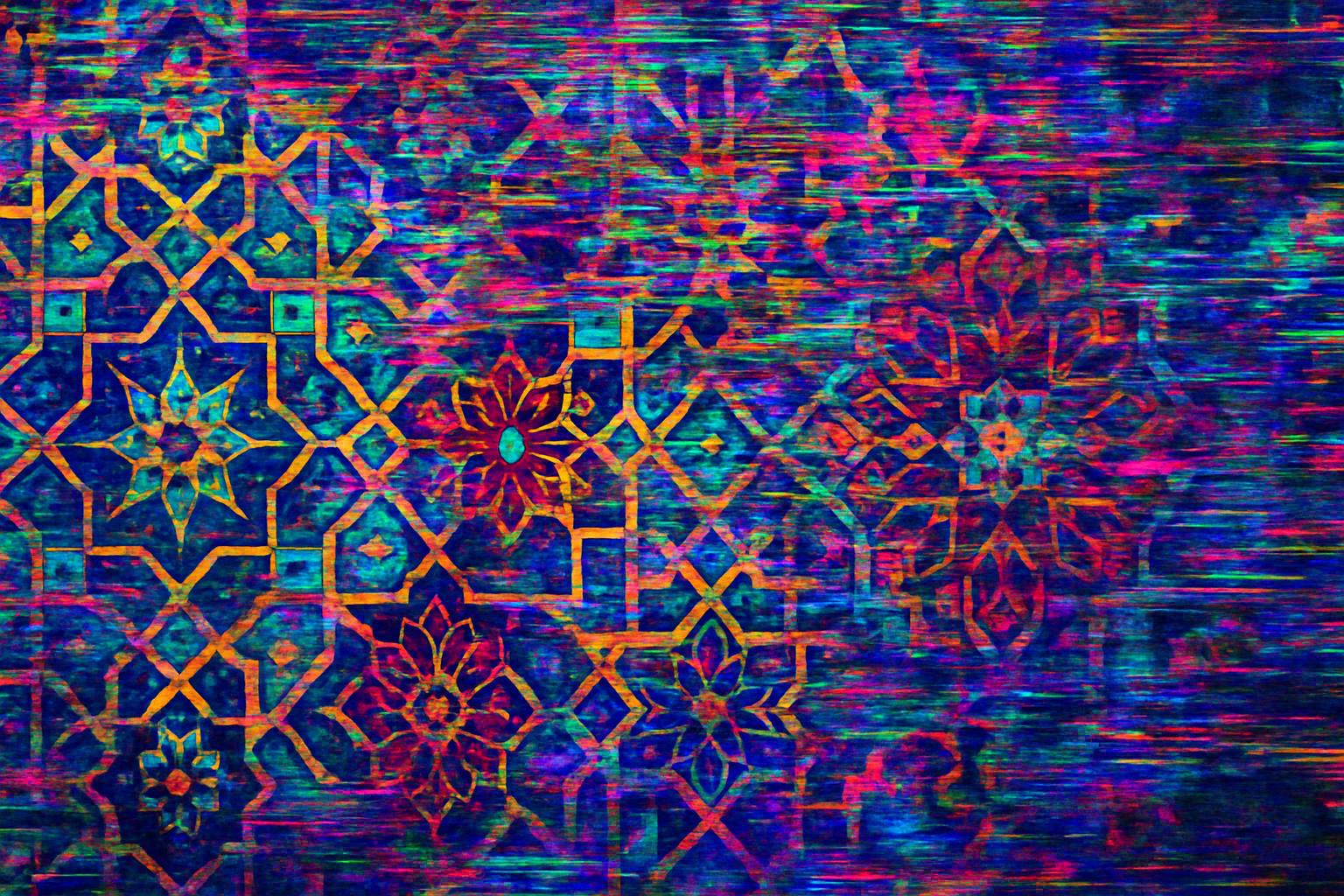
By Faheem A. Hussain
In the dusty corners of the internet, a cryptic yet increasingly influential movement within Muslim digital discourse has begun to stir. Known as SAIF, or Society of Alternative Islamic Futurology, it fuses Islamic traditionalism with radical techno-futurism. Born in the margins of digital space, SAIF rejects both the stagnation of the modern Muslim nation-state and the nostalgic retreat into medieval forms. Instead, it dreams—aggressively, brazenly—of an Islamic future built not through reform, but rupture. This is not traditional modernism. It’s something more raw, more unpredictable—a young vitality, still wild, unshaped, but alive.
I. The Provocation of SAIF
Thinking Alongside SAIF
What, then, is SAIF?
Keep supporting MuslimMatters for the sake of Allah
Alhamdulillah, we're at over 850 supporters. Help us get to 900 supporters this month. All it takes is a small gift from a reader like you to keep us going, for just $2 / month.
The Prophet (SAW) has taught us the best of deeds are those that done consistently, even if they are small. Click here to support MuslimMatters with a monthly donation of $2 per month. Set it and collect blessings from Allah (swt) for the khayr you're supporting without thinking about it.
This is not an explainer, nor a polemic. It is an attempt to think alongside SAIF—to take it seriously not as settled doctrine, but as a provocation worth wrestling with. Like all speculative movements, its coherence lies not in consensus, but in mood, tension, and the dangerous vitality of half-formed thought.
Marginal Digital Ambition
SAIF is a loud, discordant voice at the margins—digital in medium, but worldly in ambition. One that insists it has something urgent to say about the world beyond X. Recently, its champions[1] have claimed a corner of the internet, launched a website, and begun outlining its vision. That vision has stirred discomfort. Dismissed as trolls, internet seekers, even as heretics, its members draw both ridicule and fascination. People ask: Is this a cult? Why do they speak in riddles? Who even understands what they’re saying? And, of course, the ever-present complaint: Who chose that unreadable font on the website?
II. The Technologies It Mythologizes
Techno‑Optimism and Cynicism
Yet, beneath the chaos, there is something compelling. SAIF articulates an unmistakably optimistic vision of technology, laced with biting cynicism. It’s a messy constellation of ideas: AI-driven futures, crypto-economies that aim to seize power from states, and a commitment to radical decentralization.
Mythologizing Decentralization
What links these technologies in SAIF’s imagination is their potential to wrest sovereignty away from the state. AI is not just automation, it’s a frontier of theological and epistemological reconfiguration. Crypto is not just finance: it’s a challenge to the state’s monopoly of the mint. Decentralization is not chaos: it’s an invitation to reimagine the ummah outside the architectures of nationhood. SAIF doesn’t merely adopt these tools; it mythologizes them, seeing in each a kind of divine hacking of modernity itself. It is a vision not of reforming the state, but of rendering it obsolete.
I won’t pretend to grasp all of it. The language is sometimes elliptical, even esoteric. But I sympathize with the impulse. There’s something undeniably attractive in this herculean, even romantic, effort to wrest control from Muslim states that seem to have abandoned their world-historical destiny. Yes, the postcolonial state was once a vital node in the fight against imperialism. But today many have become little more than praetorian guards—corrupt, visionless, self-serving. China’s model, for all its sins, at least pairs its corruption with infrastructural ambition.
So why then should we assume these tendencies, the relentless centralization of the state and the centrifugal forces of decentralization new technologies open up, cannot coexist? As Anthony Giddens, and others have pointed out,[2] modernity is marked by countervailing forces.[3] Even as some state institutions centralize power, others fragment and disperse. As the meme goes: ‘why not both?’
III. SAIF’s Political Accelerationism
Accelerationism Defined
These tensions come to a head in SAIF’s most controversial impulse: Accelerationism[4]. This isn’t just a “pox on all houses.” It’s more radical, more uncompromising. SAIF appears to argue that the current liberal international order must fall entirely before something new and viable can emerge. And it is falling—before our very eyes—as China, the long-slumbering giant, begins to awaken. But SAIF pushes beyond observation; it exults in the unraveling: Let the U.S. fragment. Let the West burn its own credibility. This isn’t quietist despair; it’s strategic anticipation, even encouragement.
Strategic Anticipation vs. Conservatism
I confess, I’m more ambivalent about this. Perhaps it’s my own conservatism speaking, a conservatism I recognize and question. Yet I understand this despondency towards the shackles of the present. Even as the Neo-reactionary Nick Land[5] is endlessly quoted in SAIF circles, this giddy philosophy of accelerationism[6] is less a doctrinal commitment of SAIF than a sweeping broom of history that sees in the destruction of the present, glimmerings of the future. A future it’s determined to wrest and make in its own discordant image. This is not theory-as-program; this is theory-as-detonator.
Still, I hesitate. Acceleration burns indiscriminately. Fire burns the wheat with the chaff. And yet I see the appeal: in a world where gradualism has failed, where state-led reforms are hollow, and where the scholars, the guardians of tradition have little to say about our planetary and technological futures—one begins to understand the desire not for gentle reform, but for rupture.
IV. Aesthetic Obscurity and Elitism
Obscurity as Experiment
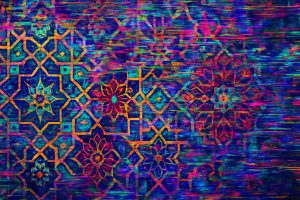
That doesn’t justify every lapse into obfuscation—but it does suggest that something more experimental is underway. Perhaps the familiar languages and citations will only lead us back to the same old dead ends. Maybe it’s time to break the walls, to risk dreaming anew, even if that means embracing a fractured and strange prose. Modernists have done this before; why not again?
Elitism and the “Biomass” Critique
The charge of elitism also sticks. SAIF too often oscillates between dreams for the masses and a poorly concealed disdain for them; the biomass[7] as it uncharitably calls them. It is not just impolite; it risks repeating the dehumanizations SAIF otherwise resists. Yet, even this hostility, discomforting as it is, emerges from a raw frustration at the inertia of Muslim collective life.
V. Modernity Without Capitulation
Escape from Stale Binaries
SAIF’s provocations don’t emerge from a vacuum. They are in dialogue, sometimes obliquely, sometimes explicitly, with deeper intellectual efforts to escape the stale binaries that dominate Muslim discourse.
One of the more provocative thinkers that SAIF cites, though by no means identical to it—is the work of Shaykh Dr. Sherman Jackson. His book Islamic Secular[8] mounts a radical challenge to the key intellectual binaries that govern so much of contemporary Muslim thought; the specific relationship between the Secular and Religious, with most arguing that in Islam there is no Secular. The book, controversial and dense, doesn’t offer easy solutions. But it does do something more important: it reframes the terrain. The Islamic Secular is a book that challenges much of what is taken-for-granted in the shallow shoals of much of contemporary Muslim thinking.
Islamic Secular Reframing
That the Islamicate needs to modernise—a truth long evident to anyone who has seriously reflected on its present condition—now finds powerful articulation in a leading thinker, native and rooted in Islamic tradition, offering a rigorous and compelling argument to many who once believed they had to choose between piety and modernity.
Jackson forces us to ask whether a Muslim engagement with modernity must come at the cost of religious integrity, or whether another path exists, one in which secularisation can be understood in Islamic terms, rather than simply inherited from liberal genealogies. In doing so, he opens up new pathways of thinking: whence before, in order for Islam to modernise and go forward, it must liberalise and Westernise; now we can conceivably modernise without necessarily Westernising.
This intellectual grounding does not validate SAIF, nor does it tame it—but it does help explain why, even when it veers into the polemical or absurd, it resonates. What we’re witnessing is not just aesthetic rebellion. It’s the stirrings of a deeper civilisational anxiety: how to remain faithful without remaining frozen.
VI. The Stakes of Imagination
Civilisational Urgency
So why does all this matter? Who cares about some obscure movement on the edges of social media? Because if we don’t make room for these provocations, we resign ourselves to a future shaped entirely by others.
Imagination as Our Rarest Resource
The stakes aren’t academic. They’re civilizational. In an age where the Islamic world is too often reactive, tethered to outdated scripts or imported frameworks, SAIF dares to wrest the horizon back. Not to mimic, but to myth-make. To resist the slow death of imagination. If we cannot afford to be naive, we can even less afford to be stagnant. And whatever else SAIF may be, it is not stagnant.
Imagination is the rarest resource in our intellectual economy. If we do not make space for speculative energy—wild, abrasive, half-formed—we surrender the future. The Islamic world often repeats the past or mimics the West.
When Muslims invoke a mythologized past as a salve for the present, as if nostalgia alone will birth the future; when fiqh-maximalists offer nothing beyond more law and more piety; when conformity is prized over imagination, it becomes clear how narrow our collective vision has become. When people are being killed in the name of piety, and scholars cling to ossified traditions with little to say about the actual future, SAIF’s provocations, however brash, begin to look less like noise and more like signal.
One need only walk through Singapore, Shanghai, Guangzhou, Chongqing, even Dubai—the unmistakable sense is not that the future has arrived, but that it’s already leaving us behind. While dawah brothers argue theology on YouTube, the very ground beneath us hums with change we scarcely register. Even if you don’t share SAIF’s disdain for the “biomass” or its critique of legalist orthodoxy, you can’t deny that the critique itself arises from something real. There is something here.
VII. Genealogies and Lineages
Historical Echoes of Futurism
Even as we watch it bloom—and maybe eventually wither—perhaps this is what it felt like when Islamic thinkers first discovered the radical futures of the West. When Ottoman reformers grew tired of the false promises of vested interests. When Cairene intellectuals stood both fearful and intrigued before Western technologies, and now, increasingly, Chinese ones. There is something wild in this modernity, something vital. Perhaps that explains the childlike innocence—yes, a good kind of naivety—of those discovering they may be the only ones both frightened by AI’s unknowns and enamored by its possibilities. Who wonders aloud about the future of money, and what crypto might do to a state long defined not only by violence, but by the monopoly of the mint.
Futurist Tradition in Islam
And so while SAIF’s wild futurism may seem like an anomaly, it has a deeper lineage. In some ways, it echoes the disorienting awe of the Nahda thinkers, the reformers of the Ottoman Tanzimat, or the Afghani–Abduh lineage; men who gazed at European steam engines and printing presses and asked not only “what is this?” but “what might we become if we mastered it?” They saw science and technology not as threats, but as instruments Muslims had to reclaim to restore dignity. They, too, were accused of heresy, elitism, and incoherence.
Those individuals were not merely reformers, but speculative futurists of their age. They dreamed of a world where the ummah could rise again – not by copying Europe, but by mastering its tools and exceeding its limits. And like SAIF, they were animated by the conviction that a future could be imagined that was neither Western mimicry nor medieval retreat, but something more vital – something that was theirs.
New Futures
And yet, in so many ways, SAIF is an atypical modernism. Many of its contributors are not anti-traditionalist. Some are deeply traditional, even arch-traditionalist. What unites them is the conviction: that Islamic civilization will rise again, and that new futures must be imagined to make that possible. This is not a traditionalism that believes old solutions will suffice for new problems. It’s a traditionalism that knows the future must be shaped, not inherited.
For SAIF, ‘wisdom’ is not the property of others – a belief that betrays a lack of confidence of the faithful, when the opposite is true. Indeed wisdom is not a closed archive, but a living challenge. The believer’s confidence must include the ability to adapt, to wield, to absorb —and from it all, transform. The believer can wield, and force our vision of the future that is rightly ours. In that confidence, SAIF is unified, even in its dissonance, all its various visions and voices.
VIII. Final Thoughts
Provocations and Collective Vision
SAIF isn’t a tight ideology. It’s a series of provocations, a set of thought experiments. In that sense, it reflects the Ummah itself: overlapping visions, contradictions, tensions. But at least it’s a vision wholly turned toward the future, not with despondency or despair, but with strategic ambition.
Fellow Travellers in Speculation
For all these reasons, while it may be a small, obscure internet tendency today, the broader civilizational future of Islam may have to look something like this. In SAIF’s strange prose and electric provocations, we might just glimpse the first sparks of what must emerge, that is if Muslim civilization is ever to rise again and take its rightful place under the sun.
This, I think, is why I’m cautiously optimistic. SAIF, or something like it, is indeed necessary. Perhaps SAIF will fragment; too obscure, too abrasive, too unstable. But where else are such attempts being made? Where else is the future imagined, not as a crisis to be avoided, but as a space to be seized? We ought not to see SAIF as Islamicate thought in its final form, but as an early experiment. Some of the ingredients of a future vision are already here, scattered, unstable, perhaps, but unmistakably present. And that, for now, is enough.
So while I’m not a SAIF member or even an advocate, perhaps insofar as this is all true, I too am a fellow traveller. And perhaps in some sense we all are, and perhaps in some sense we all must be.
Footnotes:
[1] One of the main figures is the anonymous account of @ibnmagreb for more of his thoughts can be found here in Iqra Post Substack. A detailed interview can be found here in – INTERVIEW: IBN MAGHREB – https://qawwam.online/interview-ibn-maghreb/
[2] Zygmunt Bauman’s concept of liquid modernity offers a profound lens through which to understand the fluid and transient nature of contemporary society. In his seminal work, Liquid Modernity, Bauman explores how the shift from “solid” to “liquid” modernity has transformed various aspects of human life, including identity, relationships, and work.
Emma Palese’s article, Individual and Society in the Liquid Modernity, provides an in-depth analysis of Bauman’s theories – Individual and Society in the Liquid Modernity – https://springerplus.springeropen.com/articles/10.1186/2193-1801-2-191
[3] Anthony Giddens’ concept of modernity emphasizes the simultaneous processes of centralization and decentralization within modern institutions. In The Consequences of Modernity, Giddens discusses how modernity inherently involves globalizing tendencies that both centralize and decentralize social structures. He notes that while certain domains experience increased central control, others witness decentralization, reflecting the complex dynamics of modern societies. See The Consequences of Modernity
A shorter introduction can be found in Giddens’ essay “The Globalizing of Modernity” delves into these themes, highlighting the inherent globalizing nature of modernity and its impact on social institutions. – https://depthome.brooklyn.cuny.edu/aod/Text/Giddens.pdf?
[4] Loathe as I am ever to cite a wikipedia article; it is surprisingly good – https://en.wikipedia.org/wiki/Accelerationism(accessed 28/05/25). But see this critical review of it ‘A U/ACC PRIMER’ – https://xenogothic.com/2019/03/04/a-u-acc-primer/ Well worth reading
[5] This is perhaps his most famous essay – ‘A Quick and Dirty Introduction to Accelerationism’ – https://web.archive.org/web/20180113012817/https://jacobitemag.com/2017/05/25/a-quick-and-dirty-introduction-to-accelerationism/
[6] A compelling history of the movement is perhaps this ‘Accelerationism: how a fringe philosophy predicted the future we live in’ – https://www.theguardian.com/world/2017/may/11/accelerationism-how-a-fringe-philosophy-predicted-the-future-we-live-in
[7] See this article What’s a “Biomass”? – by Abvdullah Yousef one of the key provocateurs of the movement.
[8] This review is published by Ahmed Askary, @pashadelics, the editor-in-chief of another new and exciting Muslim publication, Kasurian, determined to grapple with Islam’s present and future.
Keep supporting MuslimMatters for the sake of Allah
Alhamdulillah, we're at over 850 supporters. Help us get to 900 supporters this month. All it takes is a small gift from a reader like you to keep us going, for just $2 / month.
The Prophet (SAW) has taught us the best of deeds are those that done consistently, even if they are small. Click here to support MuslimMatters with a monthly donation of $2 per month. Set it and collect blessings from Allah (swt) for the khayr you're supporting without thinking about it.
Faheem A. Hussain is an independent researcher exploring questions at the intersection of Islamic thought, philosophy, and modernity. He holds a BA (Hons.) in Arabic and Islamic Studies from SOAS, University of London, an MA in Philosophy from Heythrop College, and a PGCE in Religious Studies from Roehampton University. His writings—often situated between tradition and speculative reflection—can be found on Substack at faheemahussain.substack.com and occasionally on Twitter @FaheemAMHussain.


An Unending Grief: Uyghurs And Ramadan Under Chinese Occupation

5 Signs Your Teen is Struggling with Imposter Syndrome | Night 2 with the Qur’an

The Ramadan You Were Written For: Show Up In Every Way Possible

Who Am I Really? What Surat Al-‘Asr Teaches Muslim Teens About Identity | Night 1 with the Qur’an

What Would the Price Have Been for Not Drawing the Line? A Response to Imam Dawud Walid and Zainab bint Younus

How to Make this Ramadan Epic | Shaykh Muhammad Alshareef

[Podcast] The Parts of Being an Imam They Don’t Warn You About | Sh Mohammad Elshinawy

[Podcast] Guardians of the Tradition: Muslim Women & Islamic Education | Anse Tamara Gray

Op-Ed: Bitterness Prolonged – A Short History Of The Somaliland Dispute

Starting Shaban, Train Yourself To Head Into Ramadan Without Malice

5 Signs Your Teen is Struggling with Imposter Syndrome | Night 2 with the Qur’an

Who Am I Really? What Surat Al-‘Asr Teaches Muslim Teens About Identity | Night 1 with the Qur’an

[Podcast] Guardians of the Tradition: Muslim Women & Islamic Education | Anse Tamara Gray

How to Make this Ramadan Epic | Shaykh Muhammad Alshareef

[Dhul Hijjah Series] Calling Upon the Divine: The Art of Du’a (Part 1)
MuslimMatters NewsLetter in Your Inbox
Sign up below to get started
Trending
-
#Current Affairs1 month ago
[Podcast] Should Muslims Ally with Conservatives or Progressives? | Imam Dawud Walid
-
#Current Affairs1 month ago
Op-Ed: From Pakistan To Gaza – Why Senator Mushtaq Ahmad Khan Terrifies Power And Zionism
-
#Islam3 weeks ago
How to Make this Ramadan Epic | Shaykh Muhammad Alshareef
-
#Life3 weeks ago
[Podcast] The Parts of Being an Imam They Don’t Warn You About | Sh Mohammad Elshinawy
